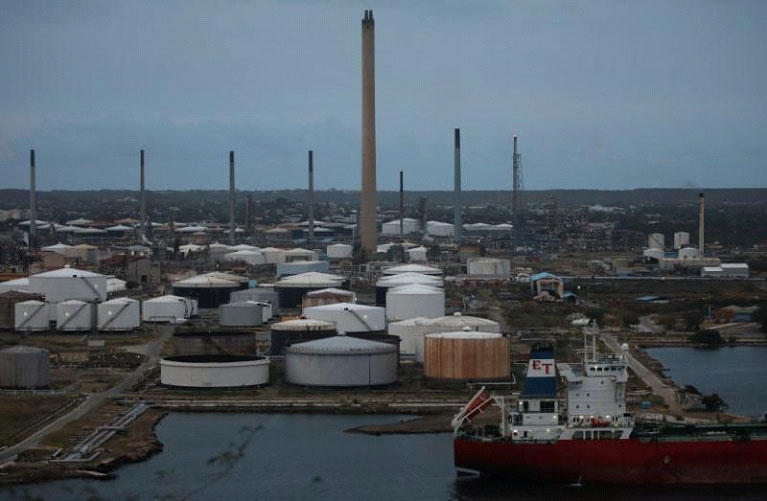(Reuters) – Venezuela’s state-run oil company PDVSA is preparing to shut a Caribbean refinery that is running out of crude amid threats by ConocoPhillips to seize cargoes sent to resupply the facility, according to two sources with knowledge of the situation.
Conoco of the United States last week began legal actions in the Caribbean to enforce a $2 billion arbitration award by the International Chamber of Commerce (ICC) over the 2007 nationalization of its projects in Venezuela. The moves have disrupted fuel deliveries throughout the Caribbean, much of which depends on PDVSA.
The PDVSA-operated 335,000 barrel-per-day Isla refinery in Curacao, which has not received new shipments from PDVSA since last week, plans to exhaust existing inventories in the coming days, the two sources said.
PDVSA did not reply to a request for comment.
PDVSA is seeking ways to sidestep legal orders to hand over assets. The Venezuelan firm has transferred custody over the fuel produced at the refinery to the Curacao government, the owner of the facility, the sources said. In another legal move to avoid oil being seized, PDVSA transferred ownership of crude to be refined at Isla to its U.S. unit, Citgo Petroleum, one of the sources added.
“The seizure in Curacao was enforced on Thursday, so the inventories’ custody was transferred. The refinery will eventually stop (operations),” the source said.
PDVSA has told customers they must send their own ships to pick up oil cargoes in Venezuelan waters, rather than wait for it to deliver. That keeps PDVSA’s ships out of Conoco’s grasp.
PDVSA, which was already struggling to export its oil amid falling output and a lack of maintenance, is looking for a place in Venezuelan waters to start transferring oil from small to larger tankers, which is typically done for large cargoes bound for Asian destinations.
The country’s oil ports increasingly are snarled with vessels waiting to load for exports.
Conoco said yesterday that it had been in touch with local officials across the Caribbean “to address issues that may arise as a result of enforcement actions.”
Curacao fuel distributor, Curoil, told Reuters yesterday the company has “diversified” its fuel supply, so it does not foresee any issues at the moment. The island’s Prime Minister Eugene Rhuggenaath earlier this week said Curacao would import fuel if the refinery is paralyzed.
In Bonaire, another of the islands affected by Conoco’s actions, there is enough fuel to continue generating electricity for at least two weeks, said Caspar Itz, a spokesman for the Dutch Ministry of Economic Affairs.
PDVSA last year shipped from the terminals it owns and rents in Curacao, Bonaire and St. Eustatius 24 percent of its total exports, or about 400,000 barrels per day (bpd). Facilities in Curacao are crucial for loading big vessels bound for China and India, while most of its fuel oil exports are sent from Bonaire.
For May, PDVSA had planned to ship from Curacao 1.45 million barrels (47,000 bpd) of fuels to Haiti, Cuba, El Salvador, Nicaragua, Belize and other smaller Caribbean islands, according to the state-run firm’s internal trade documents.
PDVSA also planned to deliver this month over 2.3 million barrels of crude and fuel oil to Citgo and Russia’s Rosneft from Curacao and Bonaire, the documents showed.
In its first official comments since Conoco’s actions started, Venezuela on Thursday suggested it was ready to pay the U.S. oil company. Conoco said it was looking forward to PDVSA’s proposals but added that absent any agreement or payment it would continue its enforcement actions.

